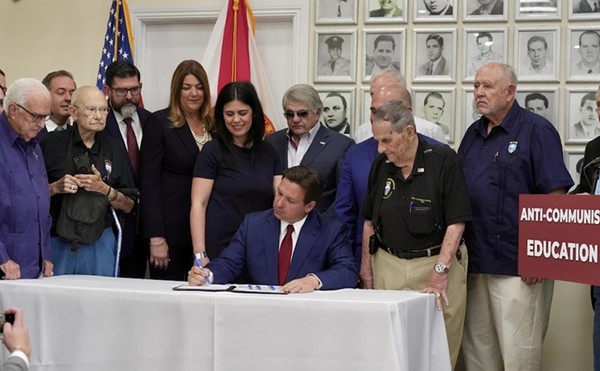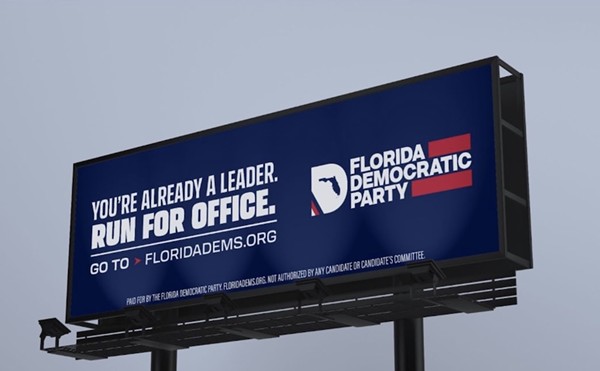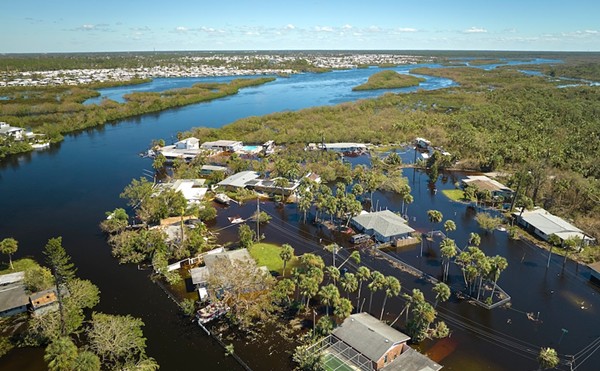As gay men and lesbians elsewhere gear up for June's celebration of Pride Month -- a time to stand up and "come out" -- many among Orlando's gay population are ready to lie down, wiped out by the expansive calendar of events surrounding Gay Days.
This week's 11th annual Gay Days festivities at the theme parks and resort hotels are expected to draw upwards of 100,000 revelers. Most are out-of-town visitors to whom Central Florida's gay community must play host. And by the time the laser lights go out on the last dance early Tuesday morning, the annual fatigue will have set in.
"Gay Days saps the energy of all the local people who work on it and the businesses who benefit from it," says Debbie Simmons, president of the gay Metropolitan Business Association. "A lot of folks spend three weeks in bed afterwards, re-covering from all the heat and hard work."
The exhaustion comes just as area activists are trying to drum up support for Gay Pride -- a task that has not been easy, particularly since Gay Days burst upon the scene. Crowd counts for a succession of local Pride picnics, fairs and parades have done little to build the gay community's confidence. In the past 10 years, attendance figures often have been downright embarrassing.
Simmons says the timing of Pride, coming hot on the heels of Gay Days and during blistering summer weather, has been "problematic." So have some of the locations. "Over the years, we've had to cope with everything from polluted lakes where we couldn't swim to plagues of pigeon droppings at the [Central Florida] fairgrounds." Still, she says she is "perplexed" by the failure of any Pride event to gain a foothold in Orlando. "It's almost as if there's a stigma on us, creating disappointment after disappointment."
An annual Pride Picnic, held through most of the 1990s at the fairgrounds, was scrapped last year, a victim of rising costs, higher ticket prices and declining attendance. Similarly, Orlando's annual Pride Parade succumbed to "organizer burnout" following its 1998 finale, highlighted by a brouhaha over the flying of rainbow flags downtown. Last year, nobody even tried to stage a community-wide event to mark Pride.
Organizers of "Pride Fest 2001," set for Saturday, June 16, inside and behind the Gay/Lesbian/Bisexual Community Center of Central Florida (946 N. Mills Ave.), are optimistic that they are back on track with a plan for an afternoon fair. Two weeks later, the Center will attempt a comeback for the Pride parade. Still, skepticism runs deep, even among gay leaders.
"It is really painful that Pride events haven't worked well here in the past," says Lil Barcaski, entertainment coordinator for the festival and co-owner of Mad-Lyn's Café, which backs onto the alley where Pride Fest will take place. She blames "poor organization" more than the rise of Gay Days for previous failures. "Gay Days are no substitute for Pride days," she says.
"Gay Days is a national, even an international attraction," says Pride Fest coordinator Allen Grim. "It's wonderful to bring so many visitors to the area and it gives a positive reflection of gay pride. But it's not really a celebration of our local community."
Barcaski agrees. "Disney is far away from downtown. Most of the events are way out in Kissimmee. That's not Orlando. We need to nurture our own community, but we are suffering from a lack of cohesion."
She points to a recent critical report in the gay newspaper Watermark: "It scolded us for taking our pride to a back alley, but it's our alley," she says. "We couldn't close busy Mills Avenue -- a state highway -- so we're using the access street behind the Center and adjacent to our beer garden. It's a terrific spot for all the live music and the vendor booths -- and for the first time in years, everyone can participate free of charge."
"The new site is a big improvement from a livestock pavilion," jokes Chris Alexander-Manley, former executive director of the Center. "At least the alley is in our own gay ViMi [Virginia-Mills] neighborhood, and it's directly at the door to our community center. If things go well, maybe we'll gain the clout to close Mills in future years."
Openly lesbian City Commissioner Patty Sheehan supports Pride Fest and will speak from its stage. "I'm confident that the team at the Center can make it the most fabulous looking alley in the world," she says. "My feeling is, let's celebrate in whatever way we can, without sniping at one another."
Also slated to speak are two gay college students who received a verbal tongue lashing from State Rep. Allen Trovillion (R-Winter Park) during a recent lobbying appointment. "If you want a reason why Pride continues to be important locally, look no further than that demagogue," Grim says.
Depending on which Pride Fest organizer one asks, a crowd of 400 to 1,000 will be constitute a successful turnout -- about the same number as showed up for Ocala's very first Pride rally last year. The projected attendance is a far cry from the 10,000-plus expected to join in Tampa's ninth annual Pride weekend in early July, or even the several thousand who attended Orlando's largest Pride gatherings in the 1980s.
Alexander-Manley considers it "a little weird" that Orlando -- despite having one of the oldest gay community centers -- has such a weak record of staging successful Pride events. "My own belief is that we rely too much on very busy volunteers. Gay Days has paid staff, as does the Tampa Gay Film Festival. So do many of the bigger pride marches in other cities."
Sheehan, who worked as a volunteer on three Pride parades, agrees: "There is always resistance around here to paying anyone to do anything, but you have to hire top-notch talent if your goal is to produce a high-profile event. You need someone who can pound the pavement for corporate sponsorship.
"As the event grows, even more money is required," she says. "When I first volunteered, we were able to use the [Lake Eola Park] band shell for Pride, and our expenses ran about $1,500, including police protection. When attendance passed 2,000, we outgrew the band shell and costs quadrupled."
Sheehan notes that, problems aside, gay people here have been successful in "becoming part of the city's mainstream. It's a very comfortable community, perhaps even a little complacent."
If so, has the time passed for Orlando to attempt an annual Pride march or festival? "I don't think so," Sheehan says. "But if the community decides it wants an event with high visibility, it will have to raise enough money."
The strength of this area's gay community is in its "huge number" of organizations, says Alexander-Manley. "But our volunteer pool is seriously overtaxed with so many different groups seeking help. We need to find ways to better coordinate everyone's efforts." For example, he has suggested that the festival and parade coincide for greater impact. Dates for each this year were selected by different groups; the parade is set to step off down Orange Avenue on Saturday, June 30, two weeks after the festival.
Alexander-Manley says it's a step in the right direction that Pride Fest was conceived by The Council of Presidents, a coalition that represents several groups from leather clubs to religious denominations that meet at the Center. A major reason for the selection of the festival site is to encourage people to visit the Center's recently renovated building. Opened last year, the 4,000-square foot space has been underused; income continues to fall short of expenses.
Alexander-Manley has similar feelings about Pride: "I'd hate to see Orlando give up on it, even though June is so busy and the weather is so hot. It would be wonderful to have a big event in October." National events are timed to commemorate the June 1969 riots at New York's Stonewall Inn, considered to be the start of the modern gay-rights movement.
Simmons also would favor an autumn date. "Places with hot climates like New Orleans and Fort Lauderdale have switched their Pride celebrations to cooler months. It may be time for us to stop trying to make our plans coincide with Northern cities. We need to develop our own formats for bringing the community together."
Not all gay-friendly businesses have been eager to join the proud crowd this year. Some have expressed reservations about the scarcity of parking around Mills Avenue. The owners of one shop near the Center initially opposed the event, fretting that their "more closeted customers" might stay away on an otherwise busy Saturday. Since then, the store has agreed to participate.
"It seems we're always starting from square one and taking baby steps," Lil Barcaski says with a sigh. "But, until the day comes when I can comfortably stroll down our city streets hand in hand with my girlfriend, I'll support any event that encourages us to stand up publicly for our self-respect."
Even if, for this year at least, that stroll takes place in an alley.


















